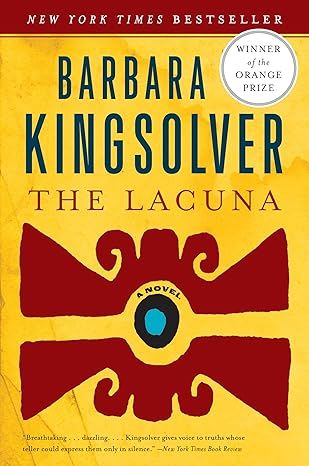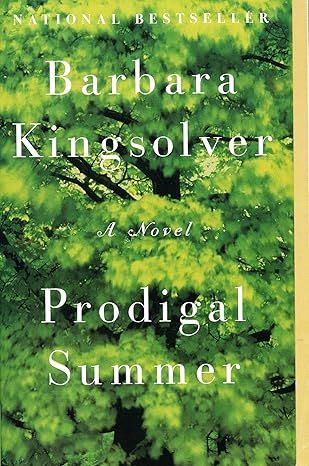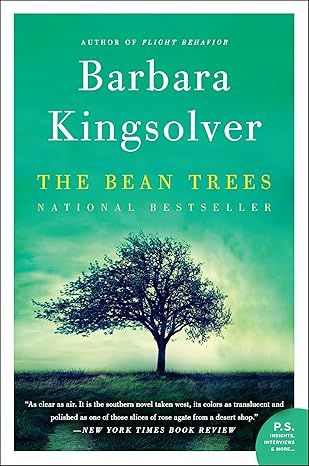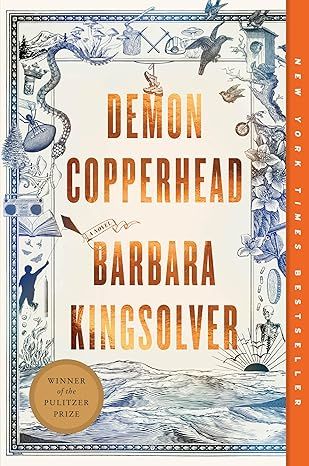The Poisonwood Bible: A Novel
4.5
-
16,256 ratings
New York Times Bestseller • Pulitzer Prize Finalist • An Oprah's Book Club Selection
“Powerful . . . [Kingsolver] has with infinitely steady hands worked the prickly threads of religion, politics, race, sin and redemption into a thing of terrible beauty.” —Los Angeles Times Book Review
The Poisonwood Bible, now celebrating its 25th anniversary, established Barbara Kingsolver as one of the most thoughtful and daring of modern writers. Taking its place alongside the classic works of postcolonial literature, it is a suspenseful epic of one family's tragic undoing and remarkable reconstruction over the course of three decades in Africa. This special Harper Perennial Deluxe Edition features beautiful cover art on uncoated stock, French flaps, and deckle-edge pages, making it the perfect gift book.
The story is told by the wife and four daughters of Nathan Price, a fierce, evangelical Baptist who takes his family and mission to the Belgian Congo in 1959. They carry with them everything they believe they will need from home, but soon find that all of it—from garden seeds to Scripture—is calamitously transformed on African soil.
The novel is set against one of the most dramatic political chronicles of the twentieth century: the Congo's fight for independence from Belgium, the murder of its first elected prime minister, the CIA coup to install his replacement, and the insidious progress of a world economic order that robs the fledgling African nation of its autonomy. Against this backdrop, Orleanna Price reconstructs the story of her evangelist husband's part in the Western assault on Africa, a tale indelibly darkened by her own losses and unanswerable questions about her own culpability. Also narrating the story, by turns, are her four daughters—the teenaged Rachel; adolescent twins Leah and Adah; and Ruth May, a prescient five-year-old. These sharply observant girls, who arrive in the Congo with racial preconceptions forged in 1950s Georgia, will be marked in surprisingly different ways by their father's intractable mission, and by Africa itself. Ultimately each must strike her own separate path to salvation. Their passionately intertwined stories become a compelling exploration of moral risk and personal responsibility.
Read more
Kindle
$14.49
Available instantly
Audiobook
$0.00
with membership trial
Hardcover
$17.39
Paperback
$12.69
Ships from
Amazon.com
Payment
Secure transaction
ISBN-10
9780061577079
ISBN-13
978-0061577079
Print length
576 pages
Language
English
Publisher
Harper Perennial Modern Classics
Publication date
June 09, 2008
Dimensions
5.5 x 1.44 x 8.25 inches
Item weight
1.1 pounds
Popular highlights in this book
The power is in the balance: we are our injuries, as much as we are our successes.
Highlighted by 3,786 Kindle readers
It is true I do not speak as well as I can think. But that is true of most people, as nearly as I can tell.
Highlighted by 3,633 Kindle readers
God doesn’t need to punish us. He just grants us a long enough life to punish ourselves.
Highlighted by 3,446 Kindle readers
Product details
ASIN :
0061577073
File size :
5611 KB
Text-to-speech :
Enabled
Screen reader :
Supported
Enhanced typesetting :
Enabled
X-Ray :
Enabled
Word wise :
Enabled
Editorial reviews
“There are few ambitious, successful and beautiful novels. Lucky for us, we have one now, in Barbara Kingsolver’s The Poisonwood Bible . . . this awed reviewer hardly knows where to begin.” — Jane Smiley, Washington Post Book World
“Fully realized, richly embroidered, triumphant.” — Newsweek
“Kingsolver’s powerful new book is actually an old-fashioned 19th-century novel, a Hawthornian tale of sin and redemption and the ‘dark necessity’ of history.” — Michiko Kakutani, New York Times
“A powerful new epic . . . She has with infinitely steady hands worked the prickly threads of religion, politics, race, sin and redemption into a thing of terrible beauty.” — Los Angeles Times Book Review
“Powerful . . . Kingsolver is a gifted magician of words.” — Time
“Beautifully written . . . Kingsolver’s tale of domestic tragedy is more than just a well-told yarn . . . Played out against the bloody backdrop of political struggles in Congo that continue to this day, it is also particularly timely.” — People
“Tragic, and remarkable. . . . A novel that blends outlandish experience with Old Testament rhythms of prophecy and doom.” — USA Today
“The book’s sheer enjoyability is given depth by Kingsolver’s insight and compassion for Congo, including its people, and their language and sayings.” — Boston Globe
“Compelling, lyrical and utterly believable.” — Chicago Tribune
Sample
Orleanna Price
SANDERLING ISLAND, GEORGIA
IMAGINE A RUIN so strange it must never have happened.
First, picture the forest. I want you to be its conscience, the eyes in the trees. The trees are columns of slick, brindled bark like muscular animals overgrown beyond all reason. Every space is filled with life: delicate, poisonous frogs war-painted like skeletons, clutched in copulation, secreting their precious eggs onto dripping leaves. Vines strangling their own kin in the everlasting wrestle for sunlight. The breathing of monkeys. A glide of snake belly on branch. A single-file army of ants biting a mammoth tree into uniform grains and hauling it down to the dark for their ravenous queen. And, in reply, a choir of seedlings arching their necks out of rotted tree stumps, sucking life out of death. This forest eats itself and lives forever.
Away down below now, single file on the path, comes a woman with four girls in tow, all of them in shirtwaist dresses. Seen from above this way they are pale, doomed blossoms, bound to appeal to your sympathies. Be careful. Later on you’ll have to decide what sympathy they deserve. The mother especially—watch how she leads them on, pale-eyed, deliberate. Her dark hair is tied in a ragged lace handkerchief, and her curved jawbone is lit with large, false-pearl earrings, as if these headlamps from another world might show the way. The daughters march behind her, four girls compressed in bodies as tight as bowstrings, each one tensed to fire off a woman’s heart on a different path to glory or damnation. Even now they resist affinity like cats in a bag: two blondes—the one short and fierce, the other tall and imperious—flanked by matched brunettes like bookends, the forward twin leading hungrily while the rear one sweeps the ground in a rhythmic limp. But gamely enough they climb together over logs of rank decay that have fallen across the path. The mother waves a graceful hand in front of her as she leads the way, parting curtain after curtain of spiders’ webs. She appears to be conducting a symphony. Behind them the curtain closes. The spiders return to their killing ways.
At the stream bank she sets out their drear picnic, which is only dense, crumbling bread daubed with crushed peanuts and slices of bitter plantain. After months of modest hunger the children now forget to complain about food. Silently they swallow, shake off the crumbs, and drift downstream for a swim in faster water. The mother is left alone in the cove of enormous trees at the edge of a pool. This place is as familiar to her now as a living room in the house of a life she never bargained for. She rests uneasily in the silence, watching ants boil darkly over the crumbs of what seemed, to begin with, an impossibly meager lunch. Always there is someone hungrier than her own children. She tucks her dress under her legs and inspects her poor, featherless feet in their grass nest at the water’s edge—twin birds helpless to fly out of there, away from the disaster she knows is coming. She could lose everything: herself, or worse, her children. Worst of all: you, her only secret. Her favorite. How could a mother live with herself to blame?
She is inhumanly alone. And then, all at once, she isn’t. A beautiful animal stands on the other side of the water. They look up from their lives, woman and animal, amazed to find themselves in the same place. He freezes, inspecting her with his black-tipped ears. His back is purplish-brown in the dim light, sloping downward from the gentle hump of his shoulders. The forest’s shadows fall into lines across his white-striped flanks. His stiff forelegs splay out to the sides like stilts, for he’s been caught in the act of reaching down for water. Without taking his eyes from her, he twitches a little at the knee, then the shoulder, where a fly devils him. Finally he surrenders his surprise, looks away, and drinks. She can feel the touch of his long, curled tongue on the water’s skin, as if he were lapping from her hand. His head bobs gently, nodding small, velvet horns lit white from behind like new leaves.
Read more
About the authors
Barbara Kingsolver
Barbara Kingsolver was born in 1955 and grew up in rural Kentucky. She earned degrees in biology from DePauw University and the University of Arizona, and has worked as a freelance writer and author since 1985. At various times she has lived in England, France, and the Canary Islands, and has worked in Europe, Africa, Asia, Mexico, and South America. She spent two decades in Tucson, Arizona, before moving to southwestern Virginia where she currently resides.
Her books, in order of publication, are: The Bean Trees (1988), Homeland (1989), Holding the Line: Women in the Great Arizona Mine Strike (1989), Animal Dreams (1990), Another America (1992), Pigs in Heaven (1993), High Tide in Tucson (1995), The Poisonwood Bible (1998), Prodigal Summer (2000), Small Wonder (2002), Last Stand: America's Virgin Lands, with photographer Annie Griffiths (2002), Animal, Vegetable, Miracle: A Year of Food Life (2007), The Lacuna (2009), Flight Behavior (2012), Unsheltered (2018), How To Fly (In 10,000 Easy Lessons) (2020), Demon Copperhead (2022), and coauthored with Lily Kingsolver, Coyote's Wild Home (2023). She served as editor for Best American Short Stories 2001.
Read more
Reviews
Customer reviews
4.5 out of 5
16,256 global ratings
Daniel Rice
5
Great book, decidedly less-than-great physical book construction (this Faber & Faber edition)
Reviewed in the United States on December 16, 2023
Verified Purchase
What a read. An absolutely fantastic book. Truly, one of the greats. I really can't speak more highly of it. Brava, Kingsolver.
But regarding Faber & Faber, the publisher: I wouldn't call this edition their best work. The cover art looks like a poor AI job, for one. Detail is kind of amorphous. And then sometime after the 3rd chapter the cover on my copy separated from its gum along the spine. So, for the couple of weeks i spent reading this book i had this big separated sheet of cover that i had to take off each time i began reading and slip back on when the session was finished. Basically just like with hardcovers, except when the dust jacket comes off of a hardcover the book still has its hard cover to protect it, and that's obviously not true with soft covers. So, yeah. Not great. The designer had the right idea because it is pretty on the shelf, but any closer inspection betrays the poor construction.
5⭐ Story, storytelling, and writing (truly exceptional) 2½⭐ This Faber & Faber edition..
Read more
5 people found this helpful
One Guy's Opinion
5
Plot - 4, Characters - 4, Theme - 3, Voice - 4, Setting - 5, Overall - 5
Reviewed in the United States on August 25, 2013
Verified Purchase
-
Plot (4 stars) - A missionary family consisting of a husband, wife, and four daughters set off to change Africa only to have Africa change them. As the months drag on, and her husband becomes more entrenched in a losing battle to change Africa into the West, the wife must take charge and decide what to do with the family--how long do they stay, how Africanized do they become, and how would they even leave if they wanted to? This struggle engrossed me. As the journey changed from vacation to maroonment, I read on, feeling the eerie shift in perspective from welcomed guests to mistrusted outsiders far from home.
-
Characters (4 stars) - Yes, we've seen the proselytizing brim and firestone preacher who charges forth completely blind to his own hypocrisy before. But thankfully the husband doesn't get much stage time. Instead Kingsolver focuses on the women, and they are wonderfully drawn. There's the tomboy, the one who goes native , the beauty queen, and the quirky nerd. And above them all, the conflicted mother. Each chapter is told from a rotating character perspective, so you see deep inside each.
-
Theme (3 stars) - I was a little disappointed with the larger theme--the follies of brining Christianity to people who don't want it, alongside the white man's rape of Africa--because I feel that both themes have been explored plenty of times before. It would have been refreshing to see a bit of the other side. Christianity has as many saints as sinners, and capitalism has as many innovators as exploiters, and we rarely see the latter in this work. That said, for the scope Kingsolver did choose to carve out, she explored it well, especially by not getting too "Dances with Wolves" with her natives and making them all into the noble savage.
-
Voice (4 stars) - Kingsolver can write. Her sentences are each crafted to capture the twang and perspective of the narrator of the moment. And she weaves each of these varied perspectives skillfully together to give the reader a clear, multi-dimensional picture of the whole.
-
Setting (5 stars) - In many ways Africa herself is a chief character in this book, and Kingsolver successfully transported me there. It's hot, it's difficult, it's dangerous, it's mysterious. It's a world where man is forced to react, instead of control. It's a world so different than my own, and yet I felt like I was there through the power of her descriptions.
-
Overall (5 stars) - I know my scores don't really add up to a 5. But this is a case where the whole is greater than the parts. The Poisonwood Bible is an epic, and when I closed it I felt filled with the experience and empty that there would be no more. Not only would I recommend it, I would read it again.
Read more
5 people found this helpful
PBI
5
An absolute stunner - epic in sweep and deeply personal in focus
Reviewed in the United States on August 27, 2020
Verified Purchase
In Barbara Kingsolver's epic novel "The Poisonwood Bible", Baptist minister Nathan Price takes his wife, Orleanna, and their four daughters to the Belgian Congo in 1959 on a mission to bring the Word of God to the tiny, impoverished village of Kilanga. The family is woefully unprepared for a life vastly different from what they knew in small town Georgia, and while all of the Prices struggle to adapt, Nathan's arrogance and dogma escalate a difficult situation into an intolerable one.
Told in chapters that alternate between the viewpoints of Orleanna and the girls, we experience life in Kilanga from very different perspectives. Mrs. Price's contributions are reflections on loss, contributed from the present in her old age as she looks back at her time in the Congo, but her daughters' stories are contemporaneous. Rachel, at fifteen the oldest, can't believe the inconvenience of life among people poorer than any she has ever met before. Leah, the older of twins, is bright and driven, working diligently and passionately for approval in the eyes of her father while befriending several of the villagers. Adah, the other twin, who has been crippled since birth, is largely silent, but keenly and cynically observant. And Ruth May, at just five years old, is independent and keen to explore her new surroundings, falling easily into the rhythms of Kilanga's children.
The first half of "The Poisonwood Bible" details the Price's arrival, the challenges they face in Kilanga, the simmering tension that begins to boil between the missionaries and the villagers, and the tumultuous fallout from President Eisenhower's decision to undermine the first democratically elected government in the Congo after the country is granted independence by Belgium. All of this crescendos to a tragic event that shatters the Price family, and sends its members on vastly different paths.
The second half of the book spans the three decades that follow, exploring how the Price women reconcile their own roles in that tragedy, and how it affects the lives they end up living. Across years and across continents we watch each of them struggle and strive to find a place for themselves in the world, with both success and heartbreak, indelibly marked by their experience in the Congo.
"The Poisonwood Bible" grew from the author's experience as a child in Africa, and its characters are as unique and substantial as anyone you'll meet in real life. Propelled by beautiful, finely crafted prose, the entwined stories of the Price women and the Congo paint a three-dimensional world, populated with people the reader grows to know and to care about, despite their all-too-human failings. Both epic in sweep and deeply personal in focus, it is an outstanding novel that consistently immerses the reader more deeply as the story progresses. Strongly recommended.
Read more
44 people found this helpful
Top Barbara Kingsolver titles
View all
Homeland: And Other Stories
4.2
-
691
$5.24

Animal, Vegetable, Miracle: Our Year of Seasonal Eating
4.5
-
2,496
$7.96

Animal Dreams: A Novel
4.4
-
2,888
$10.49

The Lacuna: A Novel (P.S.)
4.4
-
4,450
$1.77

Prodigal Summer: A Novel
4.4
-
6,309
$8.99

The Bean Trees Anniversary Edition: A Novel
4.4
-
11,504
$2.41

Unsheltered: A Novel
4.2
-
12,750
$5.24

Flight Behavior: A Novel
4.3
-
9,479
$1.84

Demon Copperhead: A Novel
4.6
-
110,129
$16.99
Similar Books
Best sellers
View all
The Tuscan Child
4.2
-
100,022
$8.39

The Thursday Murder Club: A Novel (A Thursday Murder Club Mystery)
4.3
-
155,575
$6.33

Sapiens: A Brief History of Humankind
4.6
-
140,302
$13.49

The Butterfly Garden (The Collector, 1)
4.3
-
88,556
$9.59

Things We Hide from the Light (Knockemout Series, 2)
4.4
-
94,890
$11.66

The Last Thing He Told Me: A Novel
4.3
-
154,085
$2.99

The Perfect Marriage: A Completely Gripping Psychological Suspense
4.3
-
143,196
$9.47

The Coworker
4.1
-
80,003
$13.48

First Lie Wins: A Novel (Random House Large Print)
4.3
-
54,062
$14.99

Mile High (Windy City Series Book 1)
4.4
-
59,745
$16.19

Layla
4.2
-
107,613
$8.99

The Locked Door
4.4
-
94,673
$8.53







